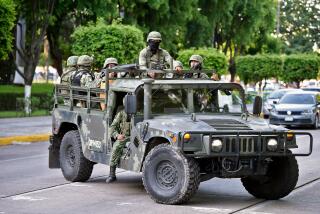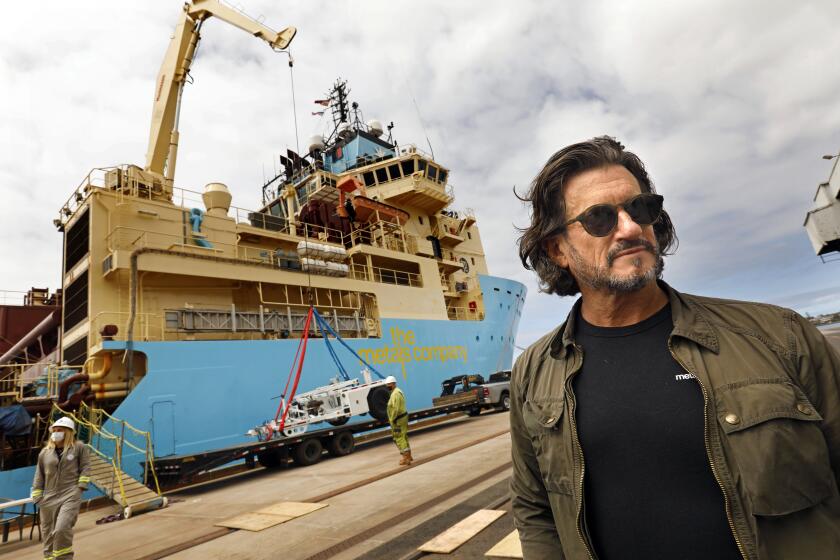Angolan Rebel Leader Savimbi Returns to Seek Presidency : Africa: He is in capital after 16 years of civil war. He hopes to become the nation’s first democratically elected president.
After waging 16 years of bloody civil war, guerrilla leader Jonas Savimbi made an emotional return from his bush headquarters to this tattered capital of Angola on Sunday and launched his campaign to become the first democratically elected president in his country’s 500-year history.
Savimbi, wearing a crisp green uniform with a maroon beret and a revolver under his belt, swaggered down a long red carpet at Luanda’s international airport, shaking hands with diplomats and waving to several thousand supporters who chanted, “Savimbi! Savimbi!”
“I come with a message of peace, and I come to the people of Luanda with an open mind,” the U.S.-backed rebel leader told reporters inside the airport building. “The process toward peace is irreversible.”
It was the charismatic leader’s first return to the capital since he was chased out in 1975, within weeks of independence from Portugal, by Cuban-backed troops from the Marxist-led People’s Movement for the Liberation of Angola (MPLA). And it marked a significant milestone in Angola’s fledgling moves toward free elections next year under international supervision.
The MPLA, which has ruled the country since independence with Soviet and Cuban military assistance, and Savimbi’s pro-Western National Union for the Total Independence of Angola (UNITA), which has been supported by the United States and South Africa, signed a historic peace accord in May. The agreement ordered a cease-fire in the conflict, one of Africa’s oldest, most devastating civil wars.
Under the accord, the government under President Jose Eduardo dos Santos, the MPLA leader, agreed to recognize UNITA, to allow it and other parties free political activity and to stage elections between September and November, 1992.
Diplomats, relief workers and Angolan citizens have been pleasantly surprised by the smooth progress of the peace accord, after a bitter war that claimed an estimated 300,000 lives, maimed 40,000 other people and left 1 million of the country’s 9 million citizens homeless.
Not only has the fighting stopped, but UNITA, which until a few months ago was planting bombs in Luanda, has set up offices in the capital, a government stronghold.
Savimbi arrived Sunday on a private jet owned by Ivory Coast President Felix Houphouet-Boigny after a four-day, three-city journey from his army’s headquarters in Jamba, in southeastern Angola. He had addressed 10,000 to 30,000 Angolans at rallies in the war-ravaged towns of Huambo, Lobito and Lubango en route to Luanda.
And, to UNITA’s delight, more than 40,000 showed up on a muggy, overcast Sunday to hear Savimbi speak at Luanda’s Independence Square. A freshly painted banner hung over the square, showing Savimbi and Dos Santos signing the May 31 peace accord in Portugal.
Many of those at the rally were supporters, but some were just curious.
“We have known him so long as an enemy,” said Valentin Neto, 40. “Now, he says he has changed. We want to see him.”
Others needed no convincing.
“If he wins this election, he will put things right,” said Angelo Feizo, 20, who was wearing a T-shirt bearing Savimbi’s likeness and the inscription, “He’s Our Choice.”
Savimbi said he will meet with Dos Santos this week before leaving for the United States, where he is due to see President Bush on Oct. 7. The United States has been a strong supporter of UNITA since 1986, contributing at least $15 million annually in covert assistance.
This seaside capital of 2.5 million people, once a picture postcard of Portuguese architecture and colorful late-night coffee shops, has deteriorated steadily since independence. Roads are potholed, unemployed men--many having lost arms and legs from the war--roam the streets, building facades have been cracked and bleached by the sun and electricity and water service is regularly interrupted.
The war is part of the reason. It has cost the government half its annual $1 billion in oil revenues and conscripted its young, productive men. But Marxist policies, a bloated civil service and corruption are also to blame.
“Luanda was once one of the most beautiful cities on the entire continent of Africa,” Savimbi said in a booming, energetic half-hour speech. “Now it’s filthy! We must make Luanda beautiful again and economically viable.”
The capital’s wide boulevards were festooned with banners, suggesting that the campaign for Angola’s elections, though a year away, already has begun.
Savimbi, 57, who studied medicine, law and political science in Switzerland and guerrilla warfare in China, and Dos Santos, 49, a Soviet-trained petroleum engineer, are considered the two prime contenders for Angola’s presidency. And political observers rate the race, at this point, a toss-up.
In recent years, Dos Santos has slowly shed his Marxist principles and has embraced free-market solutions to Angola’s moribund economy. Like Savimbi, he now strongly supports multi-party democracy, and he hopes that his more-moderate policies will win the country increased foreign aid.
Although Savimbi is considered strongly pro-Western, some analysts have expressed concern about the personality cult that has grown up around the UNITA leader. Posters in Luanda on Sunday described him as “our savior.” And the analysts fear that Savimbi, if elected, could become an authoritarian leader, as has happened with many pro-Western leaders in Africa.
UNITA officials have privately expressed concern about Savimbi’s safety in Luanda, where the bearded general is the personification of the war that has caused so much anguish. Before Savimbi’s return, UNITA had sent in a squad of 30 bodyguards and hundreds of weapons to protect him. The planeload of weapons was briefly seized by government authorities but later released.
But the arrival and rally Sunday were peaceful, and only a few government soldiers were seen patrolling the grounds, often jointly with UNITA soldiers. About 200,000 of the 240,000 combatants in the civil war are beginning to surrender their weapons and report to camps under the supervision of the Joint Political-Military Commissions, made up of representatives of UNITA and the MPLA, with observers from Portugal, the United States and the Soviet Union.
More to Read
Sign up for Essential California
The most important California stories and recommendations in your inbox every morning.
You may occasionally receive promotional content from the Los Angeles Times.






